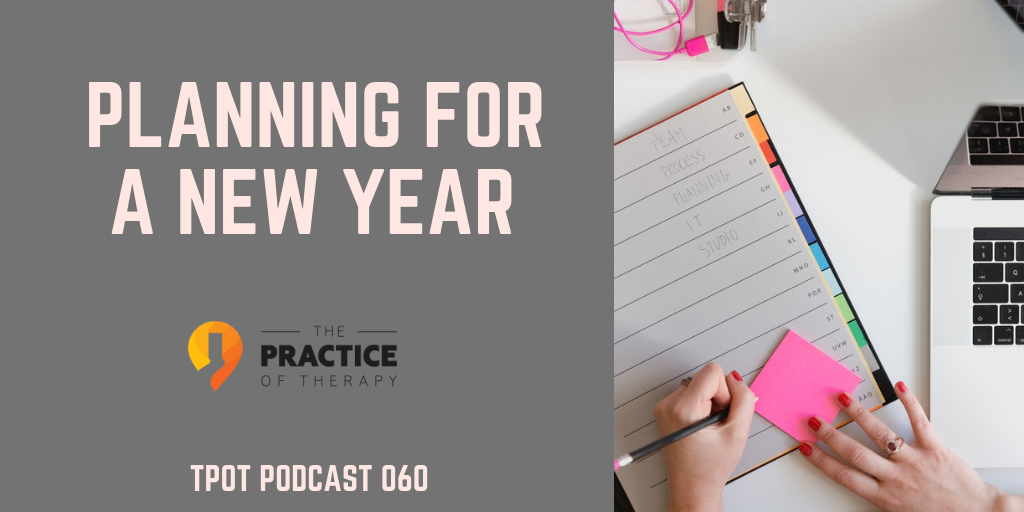
In this episode of the Practice of Therapy Podcast, Gordon opens up the show thinking about the New Year coming up and points out how everyone is in a celebration mode, planning for 2019, and making resolutions. The web conference Gordon recently took part in highlighted how to be productive in your private practice and how to improve your processes and systems. First, Gordon reveals how he went from being unorganized and even missing a client appointment to writing everything down in his planner. Then, we find out how to put the proper systems in place, tips on staying organized, and some important things to remember about goal setting.
Productivity
Gordon reveals he was not an organized person when he started his private practice he was working for an agency. With so much on his plate, Gordon felt like he was juggling many things and letting essential items slip through the cracks. One day, Gordon completely missed an appointment with a client and he was mortified this happened. Without the proper calendar and systems in place, he realized he would not be able to keep track of everything he needed to do.
Systems in Place
Getting Things Done by David Allen inspired Gordon to put the proper systems in place. Gordon has a paper planner because it causes him to slow down enough to think about his day. He recommends spending at least ten or fifteen minutes to plan your day. This planning has gone far in helping Gordon to stay on track throughout the day. Then, Gordon reveals he suffers from shiny object syndrome – continually getting distracted from something shiny. Instead of keeping things in your head, make sure they get written down somewhere you are going to look.
Stay Organized
If you were to organize your house or garage, get a big huge box and throw everything into it. The best way to capture things in your head is to have a pen and paper. Gordon uses a moleskin notebook, and his planner has a place for notes. Also, if something comes up during the day, Gordon jots it down on a list. There is no order on the list; it is just a way to capture thoughts throughout the day. David Allen says there are five things to do with the list of your random thoughts:
- Act Immediately: If it is something that can be accomplished in two minutes or less, go ahead and do it then and there.
- Delegate: Get yourself in the habit of delegation. For example, Gordon has learned to hand things off to his office assistant.
- Save for Later: These can be things related to a project or a bigger picture. Gordon gets requests to pull up medical records, and this may take a little more time to accomplish. Gordon schedules it in his calendar, so he does not forget about it later.
- Reference Materials: Save something if you want to read later, file it away, so you remember to go back and look at it.
- Delete: This is something Gordon trained himself to do. Delete things you do not need to hold onto any longer. Clean out that email inbox, ditch the clutter! Gordon gets Pinterest notifications on his personal email, and he needs to remember to unsubscribe to those Pinterest notifications.
Automate
Most of us have repeated tasks we do day in and day out. To assist with productivity, you should create a template to streamline things. Gordon uses templates for his session notes. Also, document your workflow. Creating step-by-step training for staff will simplify the workday. Screen captures and videos of the workflow process will save you time and money on training each new staff member. Once you document your workflow once, it is so much easier to delegate to others.
Goal Setting
The rule of threes. Only work on three things at a time. The process Gordon uses is starting with his yearly goals. If you write out your goals, you are sixty-one percent more likely to accomplish your goals. Keep your annual goals to no more than twelve. When writing goals for yourself, make sure you put a timestamp on it. For example, setting a goal for getting your debt down, have a specific month in mind. If you cannot do the whole goal in a single year, think about completing half of the goal in a year. Treatment plan goals need to be measurable, so should your personal goals. Don’t just say “get healthier.” Instead say, exercise four times a week.
Weekly goals should have several different steps: three goals per week and three goals per day. If you get distracted like Gordon, commit yourself to finish what you start. Finally, Gordon explains what batching your tasks means. You need to cut out your phone and all other distractions to complete one particular task. This is also referred to as sprints, getting things done in twenty-minute intervals.
Resources Mentioned
Practikat
FREEBIE: Organize Your Private Practice From A-Z
Full Focus Planner
Session Note Helper
Practice Solutions
Online Marketing Made Easy Podcast
[amazon_link asins=’0143126563,B0797FKZ7M’ template=’ProductGrid’ store=’POT Sales’ marketplace=’US’ link_id=”]
Meet Gordon Brewer, MEd, LMFT
Gordon is the person behind The Practice of Therapy Podcast & Blog. He is also President and Founder of Kingsport Counseling Associates, PLLC. He is a therapist, consultant, business mentor, trainer and writer. PLEASE Subscribe to The Practice of Therapy Podcast on iTunes, Stitcher and Google Play. Follow us on Twitter @therapistlearn and Pinterest “Like” us on Facebook.

